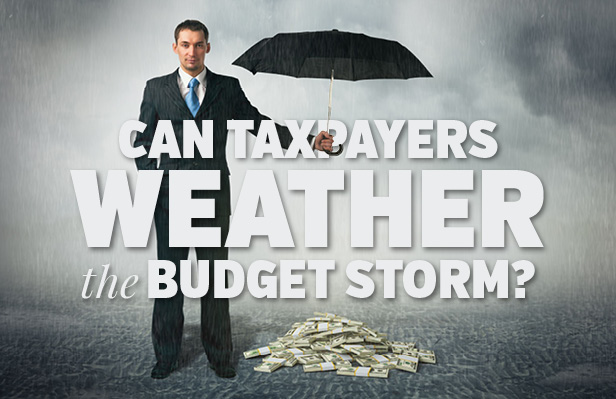Commentary

Can Taxpayers Weather the Budget Storm?
For the seventh consecutive year, Pennsylvania state government is projected to spend more money than it collects in taxes. Facing a deficit of nearly $1.3 billion, families may be asked to fork over more of their hard earned money to balance the budget.
We can’t afford to continue down this road. Pennsylvanians are already burdened with the 10th highest tax rate in the country. The average family of four would have to pay at least $400 more in taxes next year to close the state’s projected deficit.
To avoid this fate, lawmakers have the opportunity to pass a budget righting our state’s fiscal ship, protecting taxpayers, and making Pennsylvania a better place to raise a family and start a business. The other option is to ignore the state’s fiscal problems and kick the can further down the road, only delaying the tough decisions and laying the burden at our childrens’ feet.
So what can we do to put our state on the right path forward? First, lawmakers should consider freezing overall spending at current levels, which are at the highest in the commonwealth’s history. A freeze would make closing Pennsylvania’s budget deficit much more manageable. If current expenses are unaffordable, then making new purchases should be out of the question—that’s just commonsense.
By holding next year’s spending to current levels—that is, rejecting a $1 billion spending increase—reductions needed to balance the budget would be about $287 million. This is just a fraction of the $1.3 billion deficit we currently face. The Commonwealth Foundation has identified more than $475 million in “economic development” subsidies, which should be reduced to bring spending in line with revenue.
One such program is the Pennsylvania Horse Development Racing Fund, which costs taxpayers more than $250 million per year. Much of the subsidy, as the Philadelphia Inquirer noted, is given to wealthy horse owners in the form of prize money. This is an absurd waste of tax dollars, especially when the state is facing long-term budget challenges.
Some would argue that this type of economic development spending is vital to our economy and making Pennsylvania more competitive, but evidence reveals just the opposite. States that spend the most on such ventures end up with weaker economies. The key to growth is not government spending, but lowering tax burdens on businesses.
Fundamentally, it is unfair to force taxpayers to subsidize special interests. By allowing money to stay with those who earned it, lawmakers will create a favorable environment for job growth in Pennsylvania while making our system of government fairer.
But some seem to have a different idea of fairness. One commonly proposed solution to our fiscal woes is to impose a new severance tax on natural gas to make the industry pay its “fair share.”
However, natural gas companies already pay the second-highest corporate tax rate in the world, along with impact fees that pay for bridge and road repairs as well as royalties to land owners.
Singling out the industry to pay another tax is not only unfair, but would hurt farmers like Shawn Georgetti and others who rely on the industry for jobs. Shawn was living paycheck to paycheck, but thanks to the Marcellus Shale Boom, he received a natural gas lease, allowing him to improve his farming equipment, and his standard of living.
If businesses, like drilling companies, are devoting more money to paying taxes, then they’ll have less available to increase wages, hire new workers, or give people like Shawn a chance at a better life.
With tax revenues at an all-time high, the commonwealth should be focused on reducing its spending, not burdening Pennsylvanians with even higher taxes.
The opportunity to restore fiscal responsibility is now, before the hole gets deeper and the solution more painful.
# # #
Bob Dick is a policy analyst at the Commonwealth Foundation (CommonwealthFoundation.org), Pennsylvania’s free market think tank.